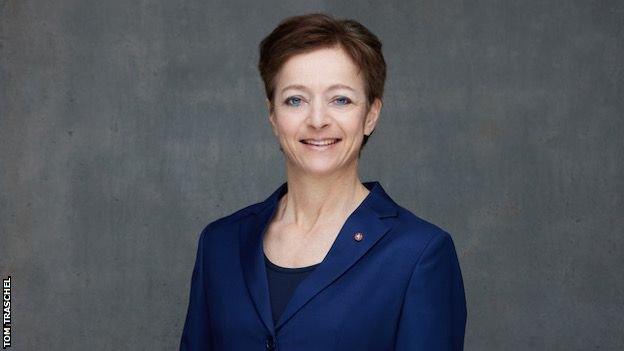Sarah Lewis: Ex-British skier bids to become first female FIS president, months after federation sacked her
- Published

Sarah Lewis is the only woman running to be FIS president
Sarah Lewis is matter-of-fact with her words. "If you can see it, you can be it."
It's a quote so often heard but one Lewis wants to further exemplify, as she bids to become the first female president of the FIS, the international federation for skiing and snowboarding.
The catch? Just seven months ago, FIS sacked her - without warning - after she had served as its secretary general for 20 years.
"It was a total shock. It was not on my agenda, that's for sure," Lewis, who skied for Great Britain at the Calgary 1988 Winter Olympics, tells BBC Sport.
"I was not informed that there were any issues, I was not invited to participate in the meeting where my position or my person was discussed, I was not represented there and I can't explain what happened specifically.
"The snow has melted as far as I'm concerned. I have no issues whatsoever with the council members - they took the decision they took. There are no grudges, it's done, I've moved on and I've actually been able to develop in a great way."
When Lewis' departure was announced by the FIS on 9 October, it initially said the decision had been based on a "complete loss of confidence". It later removed the line from its statement.
It's not a sore point for the 56-year-old though. Such was her focus on steering the federation through the coronavirus pandemic, running for president wasn't then at the forefront of her concerns.
But her dismissal changed things, and despite its abruptness, she says she has taken "only positives" from her ousting, learning just how much support she has from within the snowsport community as well as giving her the time to boost her skills and perfect her campaign.
"I'm being actively encouraged by our national associations, by the snowsport community, and the global sports community, to stand as president," she says.
"They have full confidence that I have all of the necessary attributes because I understand our sport from inside and out, from all perspectives."
"I know the global sports landscape, I know our existing partners, I can reach out to new partners, I have absolute complete integrity, diplomacy, empathy, and everyone knows that I've got plenty of energy and drive and I work in a very focused, committed and wholehearted way for our goals.
"I think it's important that our members know they can rely on me, that I deliver."
'Gender diversity is non-existent'
What Lewis wants to deliver is a "global movement for world skiing and snowboarding, as a modern, versatile, inclusive and diverse organisation".
Her manifesto - her 'piste map' - explains how she wants to integrate the national associations further into FIS governance, as well as taking the federation through a 'digital transformation' and establishing a Covid recovery fund.
"We'll evolve our governance as well," she says. "It's very important that the community, the media, the public at large, trust the organisation, they are confident in it, in its transparency and its values."
Current FIS president Gian-Franco Kasper is stepping down after 23 years, with his replacement to be elected at FIS Congress on 4 June.
The other candidates are Swedish Olympic Committee president Mats Arjes, Johan Eliasch, the chief executive of sports brand Head, and Switzerland's ex-downhill world champion Urs Lehmann.
Arjes is an FIS vice-president and sits on the FIS council - the body that dismissed Lewis. There are currently no female members on the council, with the exception of athlete representative Hannah Kearney.
Should Lewis be elected president, she would become the first woman to hold the role, and only the fifth president in the federation's 97-year history.
"Gender diversity within the leadership is non-existent," she says.
"It's a sport that is extremely gender-balanced, the big stars are the women presently, so it's a sport where the women on the field of play are very strong, but this is not reflected in the leadership of the organisation, the decision-making.
"Leaders need to represent the people they serve to best understand their wants and needs."
Should Lewis be elected, she would join just three others as female presidents of international sport federations - Annika Sorenstam (golf), Marisol Casado (triathlon), and Kate Caithness (curling).
"For me, the important thing is do I have the capacity and the qualities? That for me is essential," she adds.
"I should not be elected because I am a woman, I should be elected because I have the capacity to undertake the role.
"The fact that I am a woman has been perceived by many, many people as a huge advantage for the organisation because it's going to send the right message."